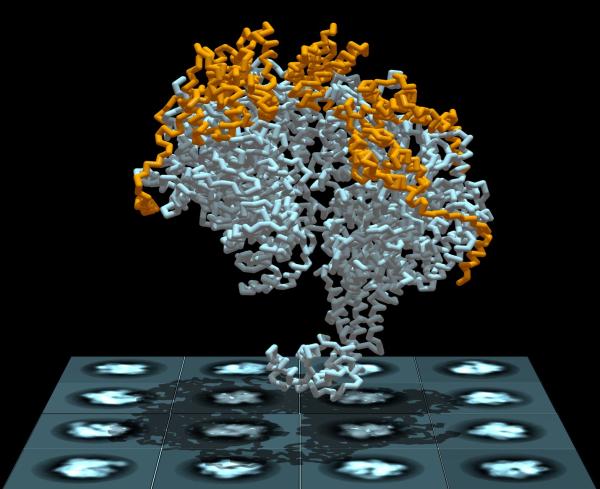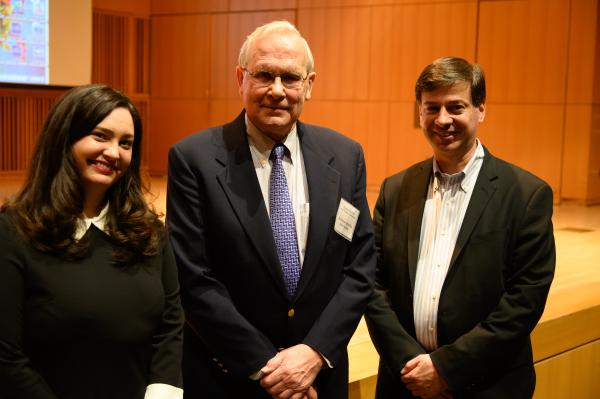
Loader proteins (orange) attach to the DnaB replicative helicase (white), causing it to briefly spiral open. Opening of the helicase enables entry of one of the DNA molecule’s two strands. Once activated, the helicase runs the length of the strand, separating them and initiating the replication process. Here, the helicase – helicase loader complex is shown atop a set of cryogenic electron microscopy images used to visualize the structure. Image credit: Jillian Chase and David Jeruzalmi

Left to right: City College doctoral candidate Jillian Chase celebrates her research recognition with GC/CUNY PhD in biochemistry Professor Emeritus Horst Schultz and CCNY chemistry and biochemistry professor David Jeruzalmi.
New research from scientists at City College and the CUNY Graduate Center (GC/CUNY) is shedding light on the mechanics of a key component in DNA replication process, and earned a doctoral candidate a prestigious prize for her work co-authoring the research.
DNA replication occurs when a helicase ring separates the DNA molecule’s two entwined and encoded strands, allowing each to precisely reproduce its missing half. Researchers have long sought to understand how the helicase—a donut-shaped enzyme composed of six identical proteins—is able to thread just one of the strands when they are bound together.
A paper published in the journal eLife, details how scientists at City College, GC/CUNY and the Advanced Science Research Center (ASRC) at GC/CUNY unraveled the mystery by producing a three-dimensional model based on cryo electron microscopy and tomography to image the helicase and its loader proteins.
The helicase loader protein (P loader) from a bacterial virus attaches to the replicative helicase causing it to spiral open and quickly reclose around one of the DNA strands, explains lead investigator David Jeruzalmi, a professor of chemistry and biochemistry at City College's Center for Discovery and Innovation and GC/CUNY. The helicase then begins running along the strand and breaking the hydrogen bounds that bind it to the second strand, allowing each to become a substrate that can replicate a complete DNA molecule.
“Going into this research, we knew there had to be a loader protein for this action to take place, but we didn’t know what the process looked like,” said Jeruzalmi. “Through our research we were able to identify the mechanism for loading the DNA strand into the helicase, and we also learned that the loader proteins prevent any movement of the helicase at the moment it opens and closes in order to prevent motion of the helicase prior to the start of DNA replication.”
In late February, Jillian Chase, a doctoral candidate in Jeruzalmi’s lab, was recognized with the Horst Schulz Biochemistry Prize, given in recognition of an outstanding research paper published in 2018. It was the third consecutive year that the prize went to a CCNY student or recent graduate, and the second in three years to a member of Jeruzalmi's lab.
Funding for the research was provided in part by the National Science Foundation which last year awarded a $945,000 grant to fund the project and follow-on studies.
About The City College of New York
Since 1847, The City College of New York has provided a high quality and affordable education to generations of New Yorkers in a wide variety of disciplines. CCNY embraces its role at the forefront of social change. It is ranked #1 by the Harvard-based Opportunity Insights out of 369 selective public colleges in the United States on the overall mobility index. This measure reflects both access and outcomes, representing the likelihood that a student at CCNY can move up two or more income quintiles. In addition, the Center for World University Rankings places CCNY in the top 1.2% of universities worldwide in terms of academic excellence. More than 16,000 students pursue undergraduate and graduate degrees in eight professional schools and divisions, driven by significant funded research, creativity and scholarship. CCNY is as diverse, dynamic and visionary as New York City itself. View CCNY Media Kit.